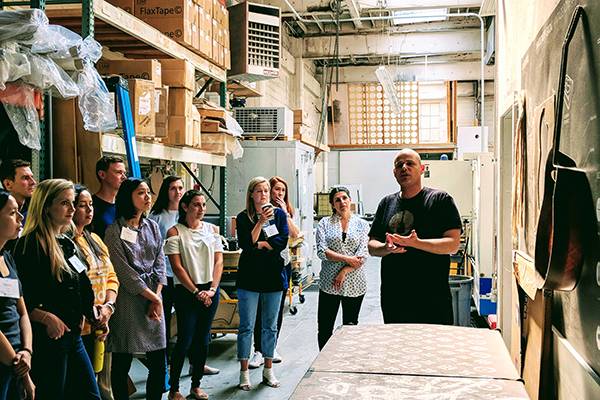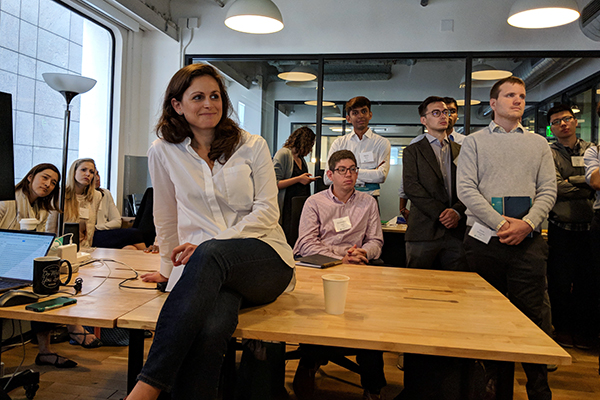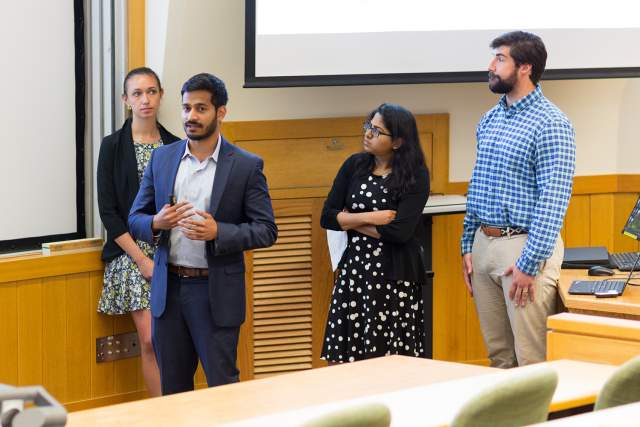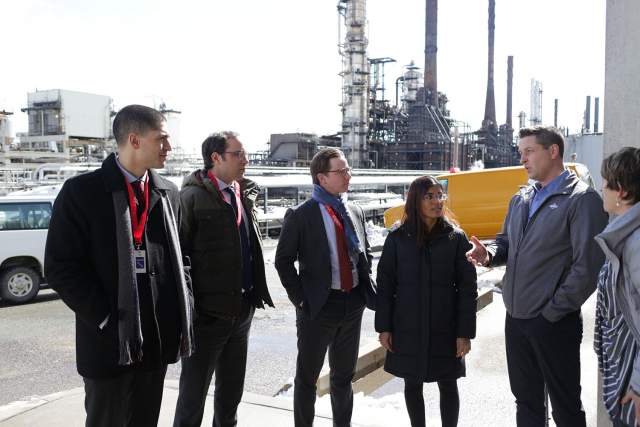New Students Explore Energy & Entrepreneurship in the Bay Area
Thirty students headed west and got an inside look at some of the Bay Area’s most innovative startups and energy companies, from Airbnb to Nest.

The trek gives students a chance to get exposure to top companies, before they even set foot on campus.
When Kara Shurmantine T’20 found out that Tuck was hosting a trip to the Bay Area that focused on entrepreneurship, she was all in.
As a first-year MBA student with experience working for a startup incubator in Boston called MassChallenge, Shurmantine wanted to learn more about entrepreneurship while exploring her career opportunities on the West Coast.
“I’m originally from the San Francisco Bay area, and I want to move back there after Tuck, so it was a great opportunity for me to network,” she says. “I’m not sure what I want to do after Tuck, but I was inspired at all the different ways in which one can be an entrepreneur.”
The Ecosystem Deep Dive: Energy Innovation & Entrepreneurship trek was led by the Revers Center for Energy, the Center for Entrepreneurship, and Tuck’s Career Development Office. Students had the option to choose the energy or entrepreneurship track but all came away with insight on how to shape their MBA studies to get the most out of their time at Tuck.
Daniella Reichstetter, T’07, Executive Director of the Tuck Center for Entrepreneurship, shared her goals for leading the entrepreneurship trek.
“My colleague, April Salas, Executive Director of the Revers Center for Energy, and I piloted this trek with the express purpose of combining career exploration, industry knowledge, and networking into one experiential learning program,” Reichstetter says.
We see this as a unique and perishable opportunity to fully immerse students in their area of professional interest prior to starting the academic year.
On this year’s excursion, Shurmantine and 29 other students (mostly first years) took part in the early August summit. The trip gave students a chance to get exposure to top companies, even before they set foot on campus, and get a rare look at what different companies and cultures are like and what kind of innovation is being done in the field. Over the span of several days, students learned from Tuck alumni and other executives working at a variety of companies large and small. (A full list of the visits is included below.)
Ilexa Gales, also a T’20, participated in the energy innovation track of the trip. She says she valued the chance to explore different facets of the energy industry, including renewables, as most of her experience up to that point spanned natural gas. She came away from the trip feeling like she has a wide range of career options to choose from.
“I was really impressed,” Gales says. “The trip was so well thought out. Every company we saw had a different focus and a different culture.”
The students also met before and after each session to debrief on the important takeaways and share what they had learned. Gales’ favorite presentation was given by Jessica Gunter, T’09, who works at Nest, now a subsidiary of Google Home that was founded in 2010 to make smart devices for the home, such as a WiFi-enabled thermostat that can save customers money on their energy bills, which Gales herself had at her last apartment.
Shurmantine and Gales both agreed that another high point of the trip was meeting other students in a relaxed and fun setting before classes began.

“One of the best aspects of the trip was the ability to meet some of my fellow classmates who I hadn’t had the chance to meet yet,” Shurmantine says. “It was great to spend time with people of similar professional interests from very diverse backgrounds.”
While on separate tracks, both the energy and entrepreneurship teams came together for shared visits with early stage companies, banks, and technology companies, to name a few, to highlight that energy careers exist in many forms, and entrepreneurs create companies across all industries. Students also participated in a number of social events, including a happy hour with local T’19 summer interns and recent Tuck alumni, as well as a wine tasting at a sustainable vineyard. These kinds of experiences facilitated more open conversations and provided additional networking opportunities.
Added Gales, “It was great to meet people who shared my interest in energy. Going on the trip in a much smaller group was valuable because I really got to know my classmates.”
The companies that students visited on their journey included: Blackbird, Lingrove, New Resources Bank, OODA Health, 3Degrees, High Fidelity, Powerhouse Clean Energy Incubator and Venture Fund, OLLY, Nest Labs, Bloom Energy, Airbnb, Cypress Creek Renewables, Barber Cellars, and Calpine (cancelled due to the wildfires).

